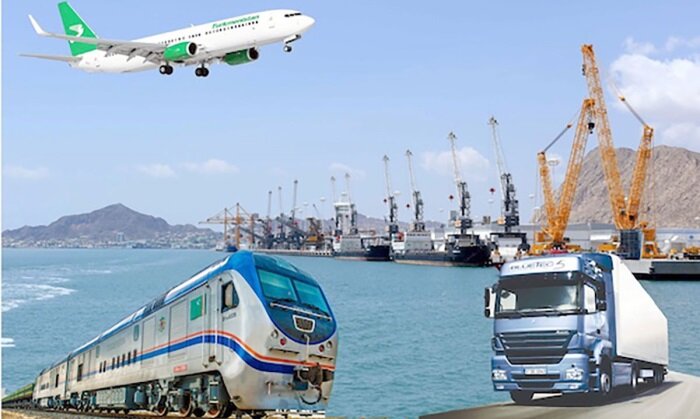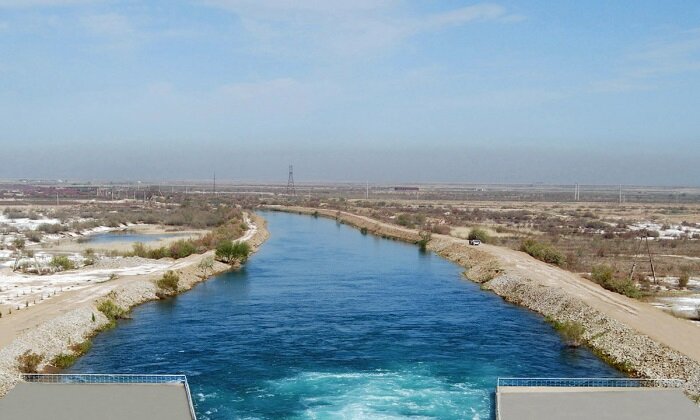 The water masses of the world are all the waters of the hydrosphere, including the world ocean, surface and underground waters of the continents. They are integral and extremely valuable natural resources of the planet. On January 31, in an interview to CentralAsia.news, Allaberdi Ilyasov, a well-known Turkmen scientist, doctor of technical sciences, spoke about the activities of Turkmenistan in water conservation.
The water masses of the world are all the waters of the hydrosphere, including the world ocean, surface and underground waters of the continents. They are integral and extremely valuable natural resources of the planet. On January 31, in an interview to CentralAsia.news, Allaberdi Ilyasov, a well-known Turkmen scientist, doctor of technical sciences, spoke about the activities of Turkmenistan in water conservation.
Great value
Fresh water is of the greatest importance. Humans can’t exist without it. People have always consumed fresh water and used it for a variety of purposes, particularly at home, in agriculture, industry and recreation. It is rather difficult to determine the exact amount of water reserves in the whole world, since water is dynamic and is in constant motion, changing its state from liquid to solid and gaseous, and vice versa.
As a rule, the total amount of water resources of the world is estimated as the totality of all waters of the hydrosphere. This is all free water that exists in all three states of aggregation in the atmosphere, on the surface of the Earth and in the earth’s crust, up to a depth of 2 thousand meters.
Current estimates have shown that our planet contains a huge amount of water — about 1 billion 386 million cubic kilometers. However, 97,5% of this volume is salt water and only 2,5% is fresh water. Most of the fresh water (68.7%) is in the form of ice and permanent snow cover in the Antarctic, Arctic, and mountainous regions. Further, 29,9% of it exists as groundwater, and only 0,26% of the total fresh water on Earth is concentrated in lakes, reservoirs, and river systems, where it is most readily available for our economic needs.
Global water problems
For many hundreds of years, human impact on water resources was insignificant and was of an exclusively local nature. The excellent properties of water — its renewal due to the circulation and the ability to purify — make fresh water relatively purified and possessing quantitative characteristics that will remain unchanged for a long time. However, these characteristics of water gave rise to the illusion of the immutability and inexhaustibility of these resources.
A tradition of the careless use of vital water resources has arisen out of the above prejudices. The situation has changed a lot in recent decades. In many parts of the world, the results of long-term and wrong actions towards such a valuable resource have been discovered. This applies to both direct and indirect use of water.
In the world, for 25-30 years, there has been a massive anthropogenic change in the hydrological cycle of rivers and lakes, affecting the quality of water and their potential as a natural resource. The volume of water resources, their spatial and temporal distribution, are determined not only by natural climate fluctuations, as before, but also by the types of economic activities of people. Many regions of the world’s water resources are becoming so depleted and heavily polluted that they are no longer able to meet ever-increasing demands. This can be a major factor hindering economic development and population growth.
History of the issue
Drought was the original problem of the Russian farmer. It complicated the situation at the beginning of the Troubles of the 17th century, poisoned life in the Russian Empire, and caused a colossal famine in the Volga region in the twenties. In 1928, people found the answer — land reclamation and planting forest belts. At the Bogdinskaya Research Station in the Astrakhan region and in the Buzuluk forest in the Orenburg region, specialists analyzed the collected data and came to surprising conclusions. So, it turned out that one pine tree seven meters high collects more than 100 kg of snow and frost during the winter, that is, it is a moisture accumulator.
In the late 40s, scientists found a way to change the climate in the Soviet Union, which would double if not triple crops, milk production, meat production and other agricultural indicators. According to them, some tree species absorb moisture in winter, which normalizes the water balance in the soil. If you plant them in the form of elongated forest belts in the correct order, then you can make the soil fertile and moderately damp even in the most terrible places, like wild steppes.
It was assumed that as a result of all the measures, the yield of grain and vegetables and the volume of meat production would increase so much that export deliveries of products would begin. But in March 1953, all these measures were considered effective, but very expensive. The Soviet economy would not take them out, so the work was gradually curtailed, the landings were dismantled for firewood, all the fish were fished out of artificial ponds, and partly drained. Within a couple of years, yields and meat production returned to their previous level, then fell even lower.
Diplomacy of Turkmenistan
Water diplomacy, pursued by President Gurbanguly Berdimuhamedov as a foreign policy priority of Turkmenistan, implies not only long-term cooperation in this vital area, but also the direct development of our own best practices. Its effectiveness can serve all of humanity.
At the initiative of the President of Turkmenistan, shown by him during the 7th World Water Forum held in the Republic of Korea, the newest vector of diplomatic activity, water diplomacy, is promoted at the UN. One of the fundamental aspects of the domestic and foreign policy activities of Turkmenistan is the meaningful use of water resources.
A careful approach to the use of world water resources can ensure the well-being of the environment and effective environmental protection, and become one of the main components of sustainable development at the global level. All these issues were reflected in the 2030 Agenda for Sustainable Development. It was adopted by the UN General Assembly in 2015. The 2030 Agenda has 17 ambitious goals in the field of sustainable development, the so-called Sustainable Development Goals (SDGs).
Being an active participant in world conventions affecting this area, Turkmenistan makes a solid investment in practical implementation. The state is focused on multilateral cooperation, which makes it possible to establish a systematic dialogue, the purpose of which is to resolve issues regarding the restoration of water supply sources, their economical and rational consumption. Preservation and restoration of water and other natural resources, combating desertification, land degradation, climate change are among the key areas of international cooperation of Turkmenistan, which is the initiator of constructive solutions to global environmental problems for the sake of the well-being of present and future generations.
Development prospects
What are the prospects for the development of the water sector in Turkmenistan? How is the structure of water use and irrigated agriculture developing? All these issues are very important for the agricultural economy of Turkmenistan. The issue of developing forecasts and an emergency strategy is determined by the natural factor and, above all, periodically recurring years in which precipitation sharply decreases, the level of surface water decreases, and the flow in rivers decreases. Such years are characterized as drought.
According to historical data, such natural phenomena are repeated in the conditions of Turkmenistan every 10 years. Sometimes their impact is irreversible, and even destroys civilizations. An example of this is the Meshed-Missrian region, which flourished on the territory of Turkmenistan in the 12th century. It was located near the Caspian Sea. Only because of the lack of water people were forced to leave this territory in the fourteenth century.
The impact of drought on the economic situation is extremely high. Thus, during the severe drought of 2000–2001 that engulfed Central Asia, economic losses were high for all countries in the region and, according to the World Bank Environmental and Social Development Division (Europe and Central Asia region), they amounted to 800 million US dollars.
Therefore, it is advisable for such a situation to also provide a system of measures that can mitigate the economic situation with a reduction in water resources during the period of the impact of a dry year. One of such factors is the creation of an insurance water reserve in Turkmenistan. Thanks to natural filtration and the use of modern technologies, it can be used for the needs of the agricultural complex, including the development of new lands, the expansion of pastures, as well as for watering green spaces and technical needs.
Environmental issues
The main causes of water pollution are sewage. Domestic, industrial and agricultural wastewater pollutes many rivers and lakes. Disposal of waste in the seas and oceans can cause huge problems, because it negatively affects the organisms that live in the waters.
Industry is a huge source of water pollution, which produces substances that are harmful to people and the environment. An oil spill poses a threat not only to water resources, but also to human settlements located near a contaminated source, as well as to all biological resources for which water is a habitat or a vital necessity. Acidic precipitation is formed by air pollution and changes the acidity of water. And global warming, an increase in water temperature causes the death of many living organisms and destroys a large number of habitats.
The protection of water resources from depletion and pollution and their rational use for the needs of the national economy is one of the most important problems requiring urgent solutions. One of the main areas of work for the protection of water resources is the introduction of new technological production processes, the transition to closed (non-drainage) water supply cycles, where treated wastewater is not discharged, but is reused in technological processes.
Closed cycles of industrial water supply make it possible to completely eliminate wastewater discharged into surface water bodies, and use fresh water to replenish irretrievable losses. Today, a number of targeted programs initiated by the head of the Turkmen state aimed at ensuring environmental well-being are successfully implemented.
Aspects of economy
The management of water resources of Turkmenistan is a defining aspect of the socio-economic policy of President Gurbanguly Berdimuhamedov. Taking into account the peculiarities of the natural and climatic conditions of the Turkmen territory, purposeful work to save water, to find new opportunities for replenishing hydro resources is carried out.
In the recent history of Turkmenistan, large-scale investment projects in the water management sector have been implemented. Hydrotechnical and reclamation facilities are built, water purification plants, desalination plants are constructed, existing water treatment facilities and water supply systems are reconstructed, the latest technologies, innovative scientific and technical developments that contribute to saving water resources are gradually introduced.
The implementation of a clear, deeply thought-out and scientifically based policy of the head of the state in the field of rational use of water resources serves as a reliable guarantee of a prosperous life.





